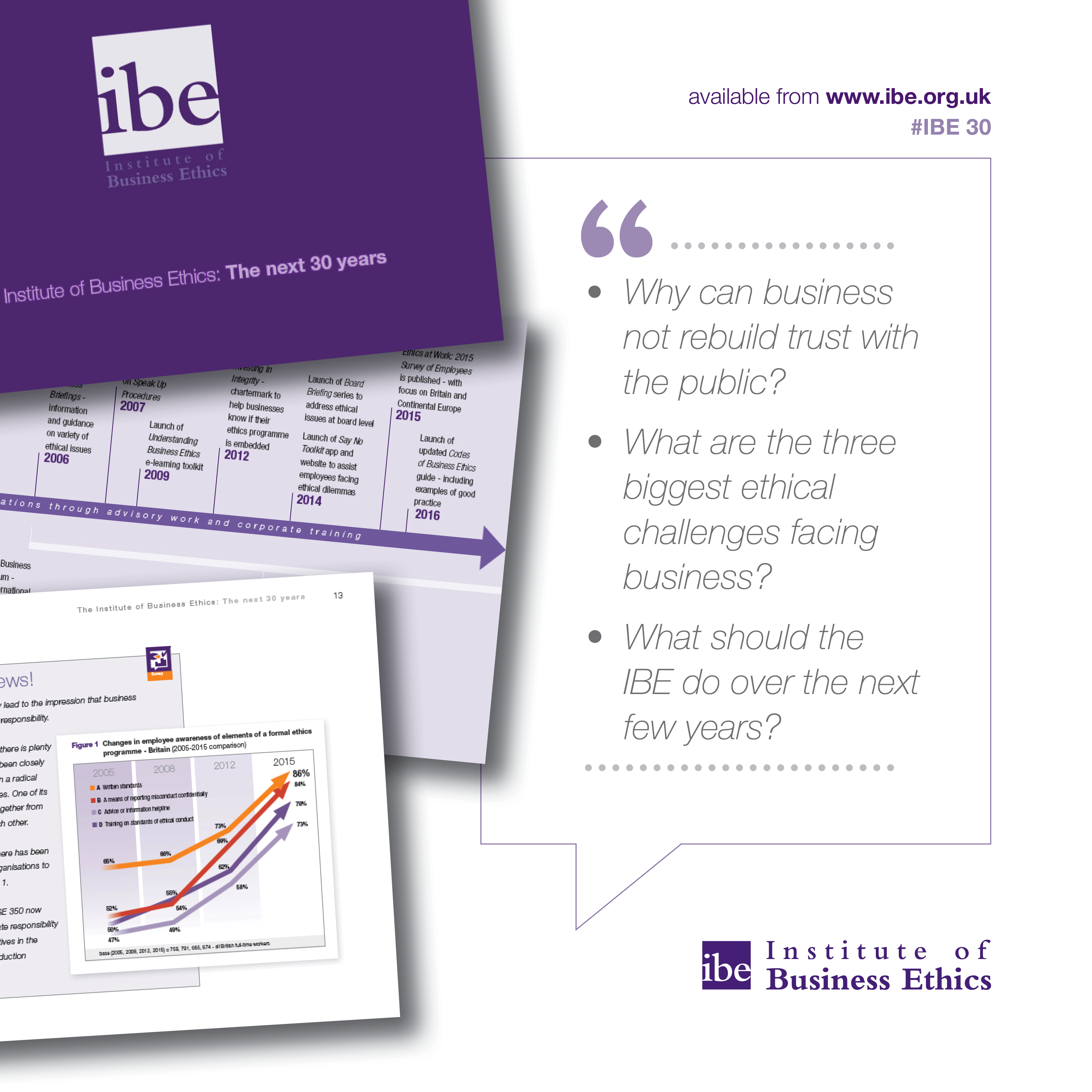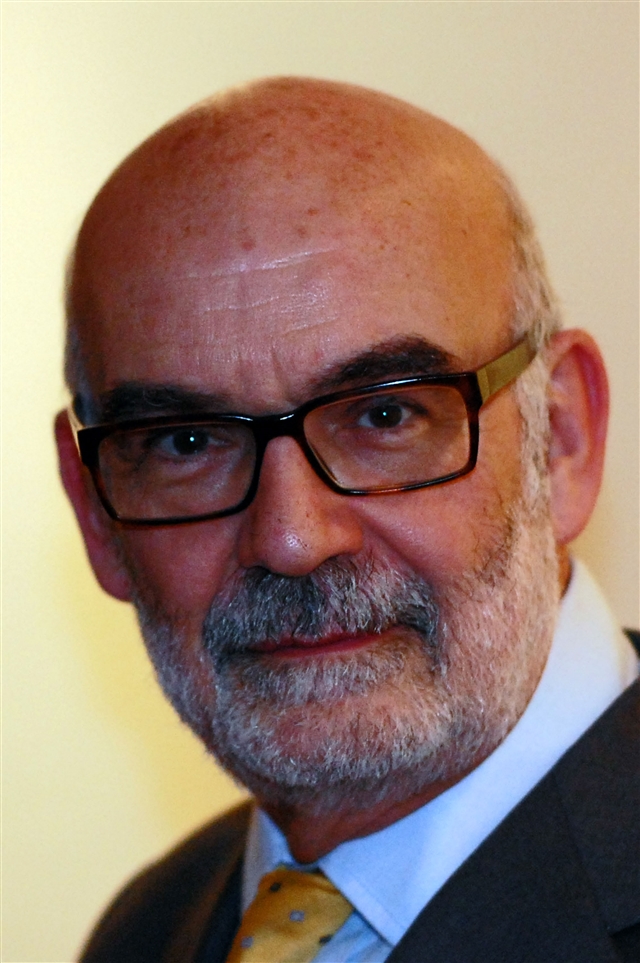The Institute of Business Ethics: The next 30 years
Business needs to do more to rebuild trust and secure its place in society
Institute of Business Ethics celebrates 30th Anniversary with publication which looks at how trust in business can be regained.
27 October 2016: The IBE publishes today a survey showing that companies are perceived by the public as only interested in profits and neglect their broader obligation to deliver value. This is seen as a key reason why business has failed to restore trust.
The financial crisis, corporate scandals and levels of public distrust have lowered the standing of business. It is no longer acceptable to say business is simply about generating profits for shareholders. Business needs to show how it contributes to social well-being wherever it operates.
If business is to regain public trust, the IBE report suggests, a new approach to business leadership is needed which is based on consensus building, the ability to embed values and connect business to society.
Philippa Foster Back CBE, IBE Director said: “The age of deference is over. A succession of scandals has undermined trust, and business is too often seen as purely interested in profit. Leaders who see themselves as individual superstars will not be able to deal easily with this. We need to look for new models – leaders who are connected with their employees and society and use this talent to facilitate good and sustainable results."
In its first three decades, the IBE has focused on helping companies with the practicalities of taking an ethical approach. In reaching its 30th Anniversary, the IBE is reflecting on the business ethics challenges in today's environment through gathering the views of others.
To help identify its priorities for the coming period, the IBE sought the views of opinion-leaders from various walks of life, including company chairmen and directors, the media and others involved in the business world, accountants and lawyers as well as its trustees and senior advisers.
Each respondent was asked to answer three questions:
1. Why can’t business rebuild trust with the public?
The lack of trust in business was frequently ascribed to the public perception that it was too focused on profit, the recurrence of scandals, controversy over executive pay and the taxation policies of multinationals. Business must become better aligned with the interests of society from which it derives its license to operate. Furthermore, boards must develop a more coherent sense of what their duties as set out in Section 172 of the UK Companies Act 2006 actually are. Profit becomes legitimate when it is earned through the delivery of real value and the genuine assumption of real risk. It is not legitimate when it is achieved by extracting value from the very customers it purports to serve.
2. What are the three biggest ethical challenges facing business?
The question about the three biggest ethical challenges threw up a multitude of answers. While some homed in on specific issues like remuneration, taxation, the supply chain, diversity and cyber issues, others offered a more overarching view, choosing to focus on the need to build consensus within the organisation, to embed values that support positive choices, to be more open and to develop a track record of sticking to principles.
Two themes stood out: customer focus and the need for statesmanship. Business needs customer champions within the leadership team so that leaders can see their business actions through the eyes of those who actually use their products.
As to statesmanship, it was critical for business leaders to be able to work with others to build the basis of trust. We need to redefine successful leadership – engaged with ethical values, less iconic and with strength of character.
3. What should the IBE do over the next few years?
As to future priorities for the IBE, there was a view that the IBE should be more vocal, do more to get ahead of the trend, to steer public debate, to help business engage with civil society and reflect an international view. It should tease out the looming issues facing business and seek to include the views of younger generations in thinking around ethics. It should be supportive of greater openness by companies, helping them to develop principles on which to base their activities and providing them with a safe environment where companies can come together and learn from each other.
The report – The Institute of Business Ethics: The next thirty years – will be launched at an anniversary breakfast to be held at the Mansion House on Thursday 27th October – 30 years to the day since the IBE was launched at the same venue. The Lord Mayor, Alderman The Lord Mountevans and Sir Gerry Grimstone, Chairman of Standard Life and Deputy Chairman of Barclays, will join Philippa Foster Back CBE to talk about the changing business ethics landscape and what the future might look like.
IBE’s Director, Philippa Foster Back CBE, said: “In response to the survey, the IBE has set out an ambitious programme for the next few years particularly in reaching out to new audiences, and new entrants to the workplace, drawing on their fresh approach to business and technology to help these with more entrenched views. There is much for us to do”
Peter Montagnon, IBE Associate Director and the report’s author, said: “Business needs to do more to rebuild trust and secure its place in society. This is not just a question of addressing specific problems like remuneration and taxation, important though these are, but of instilling the right mind-set throughout business organisations. The challenge for business leaders is to develop a culture which takes their organisation beyond mere compliance with regulation. Companies wishing to thrive in the longer-term need a sense of purpose and a set of values that are aligned with society and the more demanding expectations of the public.”
#IBE30
ENDS/
To obtain and advance copy of the report or to organise interviews with Philippa Foster Back CBE or Peter Montagnon, or to commission articles or comment please contact Katherine Bradshaw k.bradshaw@ibe.org.uk or Alexandra Johnson, a.johnson@ibe.org.uk 020 7798 6040
EDITORS’ NOTES
About the report
The Institute of Business Ethics: The next 30 years
By Peter Montagnon
ISBN 978-1-908534-29-3
Published 27 October 2016
Available from www.ibe.org.uk
About the IBE
The Institute of Business Ethics (IBE) is a registered charity established in 1986 to promote high standards of business behaviour based on ethical values.
We help organisations to strengthen their ethical culture through the sharing of knowledge and good practice.www.ibe.org.uk
A brief history of the IBE can be found here http://www.ibe.org.uk/a-brief-history/81/54
About Philippa Foster Back CBE
As Director of the Institute, Philippa is responsible for implementing strategy, leading the team and ensuring that the Institute meets its charitable aims, for raising awareness and spreading best practice in the field of business ethics.
She began her career at Citibank NA before joining Bowater in their Corporate Treasury Department in 1979, leaving in 1988 as Group Treasurer. She was Group Finance Director at DG Gardner Group, a training organisation, prior to joining Thorn EMI in 1993 as Group Treasurer until 2000.
She speaks widely on business ethics issues, encouraging high standards of business behaviour based on ethical values. As Director she runs the IBE delivering with the team advisory work, publications, training, and events, all with the purpose of raising awareness and sharing of best practice of business ethics, in line with the IBE’s charitable aim.
She has a number of external appointments, including at the Chartered Institute of Securities and Investment; RAND Europe; Barrier Biotech Ltd and is Chairman of the UK Antarctic Place-names Committee. In 2008 was a member of the Woolf Committee looking at business practices at BAE.
In 2006 she was awarded the OBE for services to the Ministry of Defence where she was formerly a NED and Chair of the Defence Audit Committee. She won the M&S/BITC Sieff Award in 2008. In January 2014 she was awarded the CBE for services to UK Antarctic Heritage.
About Peter Montagnon
Peter Montagnon joined the IBE as an Associate Director in September 2013. Prior to that he was Senior Investment Adviser at the Financial Reporting Council which he joined after almost ten years as Director of Investment Affairs of the Association of British Insurers.
For two decades from 1980 Peter was a senior journalist at the Financial Times, including spells as Head of the Lex Column and in charge of coverage of the international capital markets. His last assignment, from 1994 to 2000, was as Asia Editor, responsible for the FT’s coverage of a region stretching from Pakistan to New Zealand.
After graduating in Modern Languages from Cambridge University in 1972, he joined Reuters news agency as a financial journalist. At Reuters he completed assignments in Hong Kong, Zurich and Washington before joining the Financial Times.
Peter served on the European Commission’s Corporate Governance Forum from 2005 to 2011. He is past Chairman of the Board of the International Corporate Governance Network, a visiting Professor in Corporate Governance at the Cass Business School of City University, London, a member of the Corporate Governance Advisory Board of the Norges Bank Investment Management and of the Board of the Hawkamah Institute for Corporate Governance, Dubai.
Press release distributed by Pressat on behalf of Institute of Business Ethics, on Thursday 27 October, 2016. For more information subscribe and follow https://pressat.co.uk/
Business Business Ethics Ethics Institute Of Business Ethics Society Trust Culture Business & Finance Charities & non-profits
You just read:
The Institute of Business Ethics: The next 30 years
News from this source:





